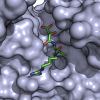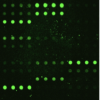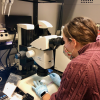Virtual Drug Design
Drug design refers to the inventive process of creating new compounds and medications based on our knowledge of a biological target. Often, this biological target is a protein that may be inhibited to provide a therapeutic effect. A detailed understanding of a protein’s structure and function is often required in the design of novel inhibitors. The Mahajan laboratory utilizes virtual, or computer-aided, drug design methods to model new compounds that are complementary to a target protein’s shape and charge. These virtually-designed lead-like compounds are then synthesized in collaboration with Stanford’s Medicinal Chemistry Knowledge Center (MCKC) for biochemical and cellular testing.
Drug Repositioning
The development of new drugs can cost upward of a billion dollars and take over a decade before the drug reaches the market. Drug repositioning makes use of existing drugs for the treatment of diseases where there are few therapeutic options. This approach can provide a safer alternative to the development of new compounds, since repurposed drugs are already FDA-approved, have proven bio-availabilities, and well-characterized side-effect profiles. To identify which drugs to reposition, our laboratory performs proteomic analyses of liquid biopsies (e.g. vitreous or aqueous humor) from diseased patients to identify drug targets and biomarkers. This approach allows for rapid, real-time repositioning of available drugs to patients with few therapeutic options.










